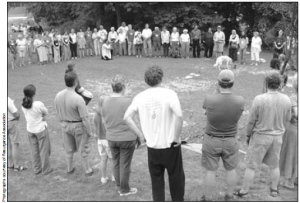Earth and Religion: Seeking a Common Ground

Originally appears in the Fall 2005 issue
As I walked across the Bard College campus on a beautiful June morning, I wondered, “What’s a nice secular humanist like me doing at a conference on ‘Earth and Religion’”? As the day progressed, my question was answered abundantly. The goals of religious leaders who are concerned about the Earth, and their methods of achieving these goals, clearly parallel those of environmental educators. Many of the conference attendees believed and sought to prove that protecting our ailing planet is a mandate of their religions. Many were engaged in re-examining their traditions to expose the underlying Earth ethic that could form a basis for environmental action by their congregations. While we “green” teachers may not draw upon faith traditions in our teaching, we, like the religious seekers at the conference, strive to do more than impart a discrete set of skills and facts. We also seek to develop an ethic of environmental stewardship in the communities we teach. Like eco-religious leaders, we know that skills and facts are not enough to change the world: mental models and “habits of the heart” must also change. As teachers, we aim not only to prepare a generation of forest managers and energy policy staffers, but also — like religious leaders — to transform society. Wise educators and religious leaders both increasingly realize the need to connect our culture, our experiences, and our very sense of purpose to the essential work of preserving our planet. Some see this work as blessed, others see it as a practical necessity — but a growing number see it as crucial.
This content is restricted to subscribers only.
If you are not yet a subscriber, please consider taking out a subscription here.
If you are an existing subscriber, kindly log in or contact us at info@greenteacher.com for more information.





